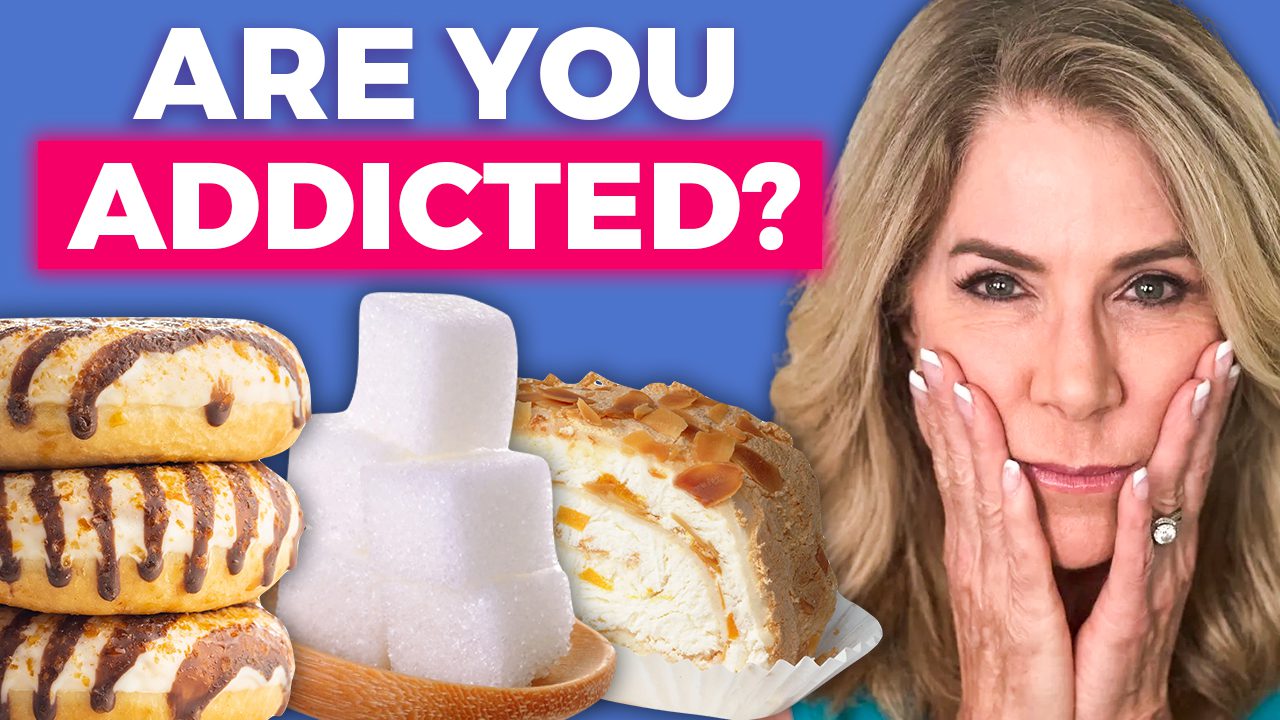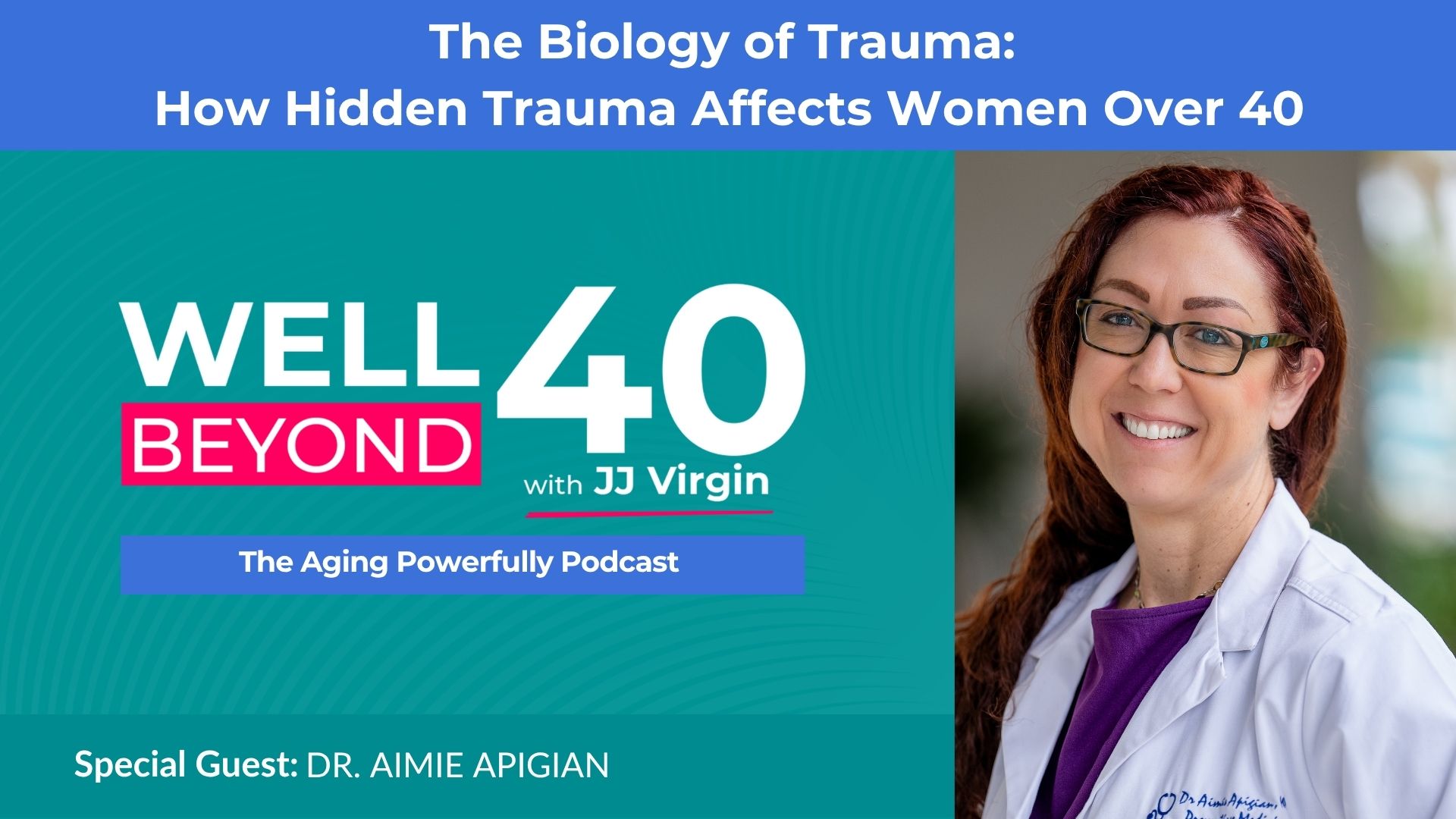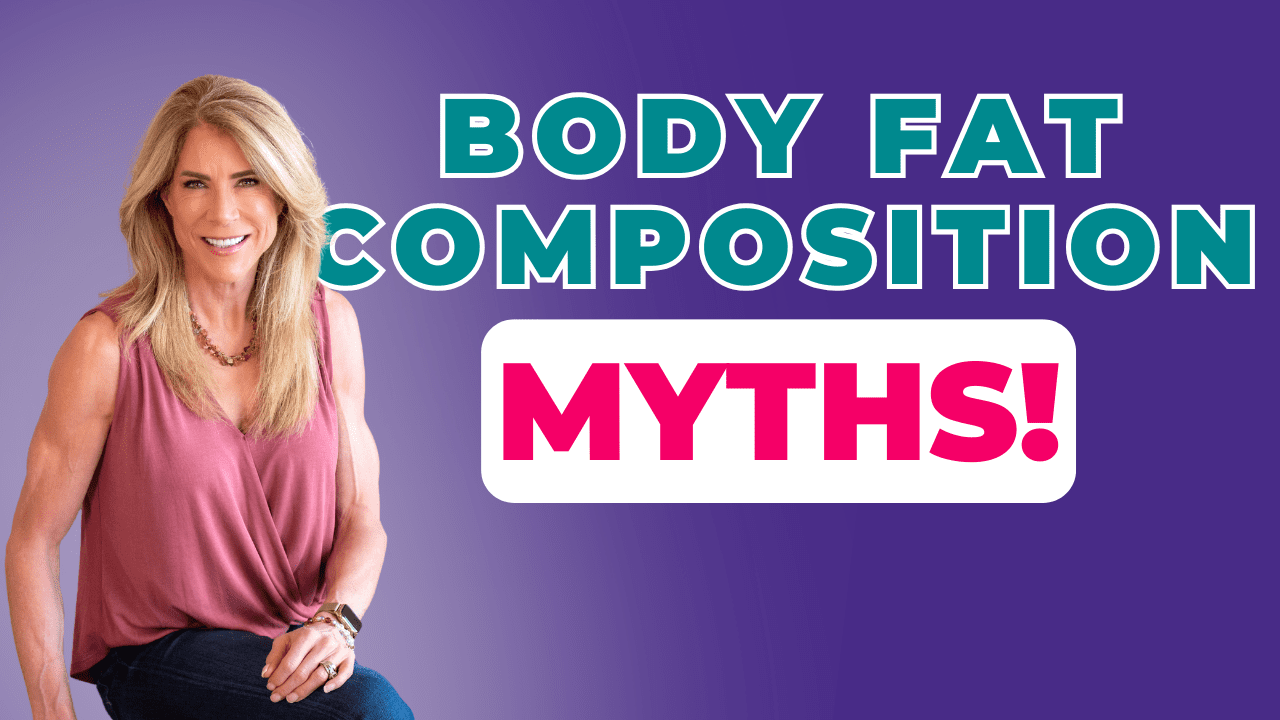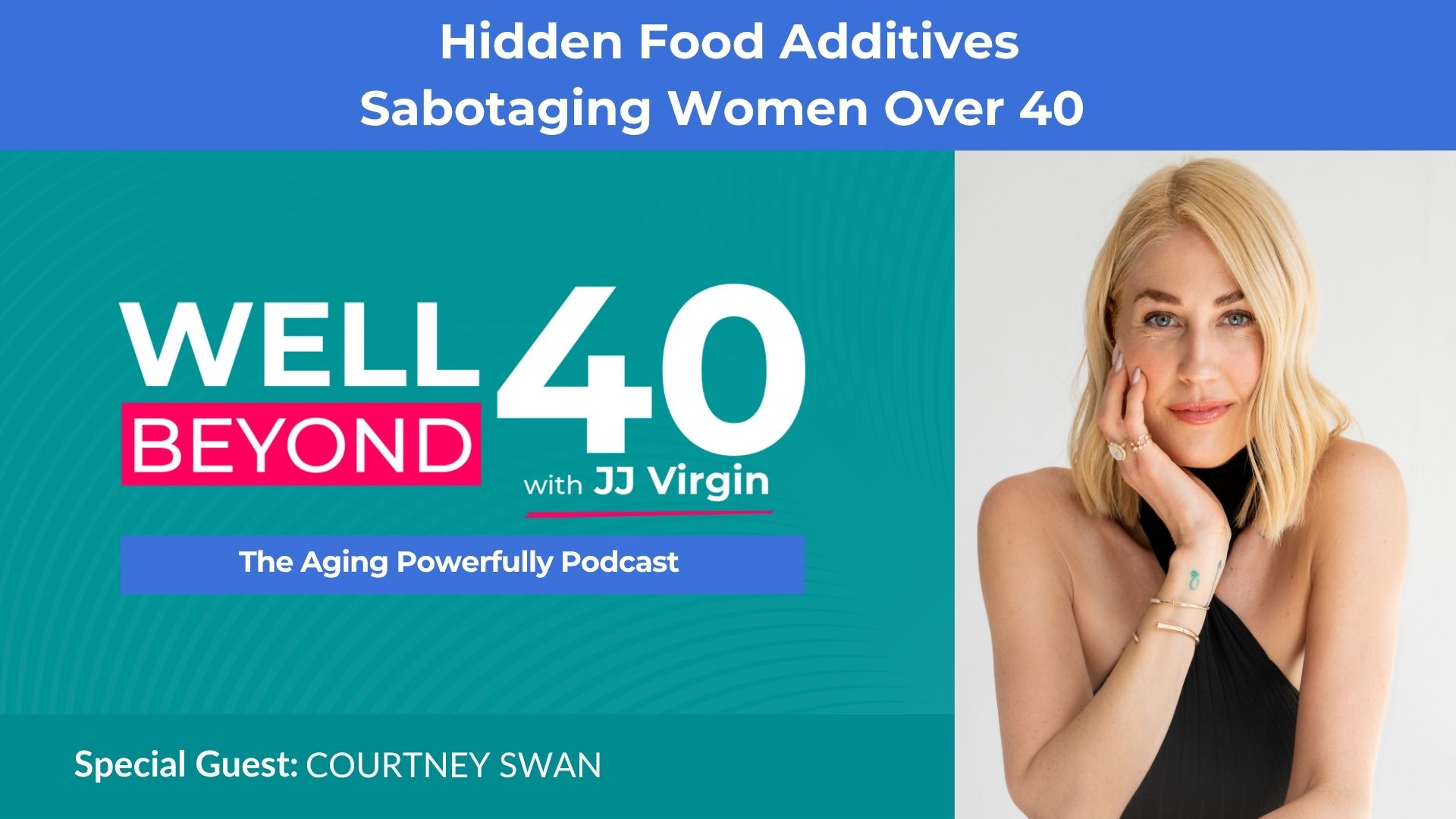What If Hidden Sugars Are Causing the Symptoms You Can’t Fix?
Sugar poses a huge threat to our health today. There are the obvious sources, like candy and soda, but it’s the sneakier sugars in your food that may be causing an addiction. I share five warning signs that you’re addicted to sugar, and reveal exactly what you need to do to break your sugar problem fast. I literally wrote the book on it! I have a wealth of tips and tools to share with you, including ways you can balance your blood sugar and retrain your taste buds, so you can finally conquer your sugar addiction… for good!
Mentioned in this episode:
Watch the FULL VIDEO on JJ’s YouTube Channel
How to Use A Continuous Glucose Monitor
NutriSense continuous glucose monitor
Eat by the plate for better blood sugar control
What is time-restricted eating?
ATHE_Transcript_Ep 526_5 Warning Signs You Have a Sugar Addiction (& How to Stop It)
JJ Virgin: [00:00:00] Hey, this is JJ Virgin. Thanks so much for joining me. This is Ask The Health Expert. In each episode, I put the Power of Health in your hands and share ways to get healthy, lose weight, heal your gut detox and lots more so you can look and feel better fast. If you’d rather watch the video, Hey, I did put on my makeup and do my hair, so check it out on my YouTube channel.
Americans are eating over 17 teaspoons of sugar a day. Even if you’re not dousing every meal with the sweet stuff, you might still be addicted because most of the sugar sneaks into your diet in really crazy ways and those symptoms you just can’t seem to fix could be connected in this. , I’m sharing five telltale [00:01:00] signs that you’re addicted to sugar and how to fix it fast.
Let’s talk about the signs. Now, by the way, some of this is genetic, but you can retrain your taste buds because most of it is exposure equals preference. And how do I know this? Cuz here’s the thing, our sugar intake has gone up enormously. It was five pounds per person. Per year in the 19 hundreds. Now it’s over 150 pounds per person, per year.
So that increase is not genetics, that is training. So you may know you have a sugar addiction, but you also may not be aware of how much sugar is sneaking in, and a lot of so-called healthy foods and what it’s doing. . Now, here are some of the signs that you’re eating too much sugar and that your body is now lying mainly on sugar for fuel.
I call that being a sugar burner, not a fat or hybrid burner. So the first one is you can’t go more than two to three hours without eating and you have [00:02:00] constant cravings throughout the day. You know, you shouldn’t have to snack between meals. In fact, I am totally against snacking, and I’m gonna share more about how to curve those cravings in a little bit.
So do not worry. Number two is you lose weight, but you can’t lose the waist. So you wanna make sure that you are doing a waist to hip measurement, so you do your waist and your hip, but also waist to height. And this isn’t just about aesthetics, by the way. It really isn’t abdominal fat or visceral fat is its own hormone central that produces inflammatory hormones that
can increase your risk of heart disease and diabetes. Now, if you can’t lose your waste, that’s a sure sign of a sugar problem. Next one, you need a little something, something after meal. You’ve trained yourself to want dessert or something sweet after every meal. And I will tell you that I was trained this way.
I was literally raised my, my name growing up. My little nickname was Poppy. Now, I grew up in California, but it was not for our state flower, the poppy, it was for Pop Tarts because I literally ate Pop Tarts. Or Captain Crunch or Cocoa [00:03:00] Puffs for every breakfast. Exposure equals preference. I was trained to eat more sweet and my mom had dessert after dinner every single night, so I was trained to to look for that.
So again, training can really make you do this. Next one is, , you’ve got symptoms of low blood sugar. This happens when your blood sugar goes up and then insulin over corrects it and it plummets because your blood sugar spikes up. Your body over releases insulin. Your job of insulin is to get the blood sugar, the glucose out of the blood and stored, and then your body ends up overcompensating.
Overshooting. And so what happens? You have a fast heartbeat. You’re shaky, you’re sweating, you’re nervous, you’re anxious, you’re irritable, you’re confused, you’re dizzy, you’re angry. Big ones. You just ate and you’re hungry again, like what’s up with that? Now, there’s also tests you can do that will tell you a lot.
The first one, of course, is just a fasting blood sugar test, and you really want to be somewhere in the 70 to 90 range. Next one is fasting insulin, where you want to be two to five or a hemoglobin a1c where you [00:04:00] really want to be 4.5 to five. Those are those ideal ranges. That’s not what you’re hear at the lab test, but I don’t want you.
Average, I want you to be optimal, right? Or elevated triglycerides. So triglycerides are fat in the blood. This is how we store fat in the body. And you really want your triglycerides to be 75 or below. They’ll say optimal is 150 or below, nope, 75 or below. And then of course your triglycerides HDL ratio.
There’s another thing that’s great and it’s using a continuous glucose monitor to monitor your blood sugar responses in real time. You do not have to cut out sugar completely. You have to choose wisely. You see all carbohydrates turn to sugar, you need to know which to choose and which to lose. And what I found is that quite often sugar is sneaking in where you would never expect it.
And the more sweet you eat, the more sweet you want. And then it starts creating blood sugar imbalances and insulin resistance. And guess what that makes you do? It makes you crave more sweet. and if you’re under any kind of stress or not getting quality sleep, then [00:05:00] this just compounds the issue. So let’s talk about how to fix fast.
And the first one I’m gonna teach you how to do is eat by the plate because you gotta have good blood sugar balance to get rid of the cravings. So, When you’re eating by the plate, this is gonna make it so that you can eat and stay satisfied. For four to six meals, you don’t need to snack. And it starts with protein first.
Why? Because protein really helps with sugar cravings. So I love protein because protein’s more thermic. It’s more satiating. . And so when you’re building your plate, you’re gonna start with first building in protein, then adding in non-starchy vegetables to get all the polyphenols in the fiber. Then some healthy fats and a little bit of slow low carb.
This is super duper important. When I take people through the sugar impact diet, one of the things I teach them, and this is really important, is to taper rather than go cold Turkey. If you’re looking this going, I really wanna lower my. What you need to do is make that shift from your body being a sugar burner to your body, being able to use sugar, fat, and ketones for fuel.
And [00:06:00] that happens over time, not overnight. And the first thing that you do is eat the protein, fat, and fiber trifecta by eating by the plate. And then you start to lower your sugar impact. So you start to take higher sugar impact foods and taper them down for lower sugar impact foods. I talk about this in the sugar impact.
Next thing I’m gonna want you to do is do more sour. Turns out this is a great hack. I learned from my buddy Donna Gates, who wrote The Body Ecology Diet is that sour can take your sweet tooth away. Well, I love sour even more because lemon juice can really help with blood sugar balance too. In fact, a tablespoon or two of lemon juice before a meal lowers a blood sugar response to a meal.
So does apple cider vinegar, by the way. And then one of the things I love too, is ginger. In fact, there was a study in. Iranian Journal of Pharmaceutical Research in 2015 that looked at how Ginger impacted blood sugar levels among people with type two diabetes, and what they found was that ginger can both work to improve blood sugar balance and it can also help cells better use glucose.
Dr. Lee [00:07:00] Broadhurst, I saw her name. I’m like, I know Dr. Lee Broadhurst. I remember hearing her speak years ago. She found that phytochemicals in cinnamon. That’s another great one. Can. Blood sugar metabolism by 20 times or more. And here’s what’s cool. Apple cider vinegar, lemon juice, improve insulin sensitivity, lower blood sugar response.
Ginger can help. And cinnamon is an amazing one because the active ingredient in cinnamon can mimic the effects of insulin to get glucose into the cells more efficiently. Cinnamon ginger, lemon juice, apple cider vinegar, easy things to add into your diet that will have a profound impact on blood sugar.
Now one of the things that I teach people to do is retrain your taste buds. And I’ll tell you, when I first started developing the sugar impact diet, my goal was take the most hardcore sugar addicts and teach them to appreciate sour and unami and spicy right, and and salty instead of sweet. So you can train your brain and your taste buds to think differently about sugar.
And I will tell you like I. All the time that once people pull [00:08:00] sugar out, they tend to crave it less, and their threshold for sweetness drastically goes down. Here’s what you need to do to get there. First of all, and this is what I do in the second part of the sugar impact diet. So I teach people actually to taste, to test, then to taper, and then I do a transition, and during that transition, I’m doing basically what’s called a fructose fast, where I’m pulling.
All the high fructose containing whole food, but I pull fructose as close to zero as possible so that you can quickly restore insulin sensitivity. It’s the first thing I have people do because it turns out the more fructose you eat, the better you are at transporting that fructose to the liver where the body will make fat.
So we don’t wanna do that and become more insulin resistant. The next thing you can do to start to improve this quickly is to do time-restricted feeding. Because doing shorter eating windows like six to eight hours can improve insulin sensitivity. Quickly. Now, along with that, what you wanna really avoid is eating late at night.
You wanna have at least a three hour window before you go to sleep. More is better [00:09:00] because eating late at night when you’ve got melatonin up and your insulin secretions are much lowered, keeps that blood sugar around and will result in a higher fasting blood sugar in the morning and poor sleep. And when you poor sleep, oh my gosh.
We’ll talk about that in a moment. But that can. Big, big challenge with insulin sensitivity. Now, one of the fastest ways to start to restore insulin sensitivity is to restore it in the muscles. And really you want to think of your muscles like metabolic sinks. These are where we can store sugar that we’re eating.
So a fast thing you can do is start to build muscle lift heavy things, eat protein. Lift heavy stuff, right? Because that muscle means that now when you’re eating carbs, they have somewhere to go because carbohydrates get stored in your muscle. It’s glycogen for fuel to use later, plus muscle’s. One of the fastest places where we start to restore insulin sensitivity.
We do that in the muscle, we do that in the liver. This is a quick place we can restore insulin sensitivity. If you’ve got better insulin sensitivity, your body doesn’t push out as much insulin in response to sugar, insulin’s inflammatory, and locks the doors to [00:10:00] fat cells. So we wanna have good insulin response.
Over response. So again, we’re gonna put on muscle to restore insulin sensitivity, but also so that now we have a place for our body to put carbohydrates for storage. Next key critical thing. I threatened, I was gonna talk about it, but I have to here is sleep. So even one poor night of sleep, you’re more insulin resistant.
and you’re hungrier and you’re not hungrier for broccoli. Let’s be real like we’ve all been there. And so sleep is so critical for restoring insulin sensitivity, having good blood sugar control. So sleep is a big one. And right along with sleep is stress. If you are under stress, It’s gonna impact your sleep.
But when you’re under stress, what happens? Number one, you tend to lower your serotonin, which is gonna make you crave more sugar. You tend to break down muscle and have higher fasting blood sugar. You’re more catabolic, which can raise insulin. So stress causes a whole host of problems along with leaky gut that can lead to all sorts of problems.
Blood sugar and with sugar cravings. In fact, [00:11:00] poor sleep and stress are big ones for craving more sugar. And what happens when you’re under stress too, is you lower your stomach acid that can impact your gut health and that can set the stage for candida overgrowth. And when you have an overgrowth growth of candida, that can make you crave more sugar because guess what?
Candida feeds on sugar and. One things that I love to do here is to use a continuous glucose monitor what you measure and monitor you can improve when you wear a continuous glucose monitor, allows you in real time to see how food, how stress, how sleep, how exercise is impacting your blood sugar so you can make the right shifts in real time.
Along with that, you wanna make sure you’re supplementing and there’s a couple key supplements that can really, really help here. First of all, fish. I mean, pretty much I talk about fish oil for everything, but when I’m thinking about blood sugar and insulin, if you’re insulin resistant, you are not gonna be able to access stored fat for fuel.
It’s gonna make you crave more sugar. Another one that I love is Burberine. Burberine is right up there with things like apple cider vinegar. It’s [00:12:00] incredible. There was a study published in 2008 in Metabolism that looked at the impact of burberine supplements on people with type two. And researchers found that burberine lowered fasting blood sugar and postprandial blood sugar levels.
I mean, that’s incredible. Like if that was a drug, it’d be being used. Burberine can work like metformin and vinegar can work like metformin. These are amazing for helping with blood sugar control. Another one’s important here is vitamin D. Vitamin D is important for so many different reasons, but it’s also super important for blood sugar control.
This was a study published in the Iranian Journal of Public Health they found that Vitamin D can support glucose balance by stimulating insulin release. and when you repair your vitamin D deficiencies, you can improve glucose control and help prevent the complications of type two diabetes. Really key critical.
When I wrote the Virgin Diet, the number one question I got asked at the end of it was like, what do I do about sugar? I can give up gluten and dairy and eggs and corn and soy and peanuts cuz I had people swap [00:13:00] out, take out the top high food intolerance foods and swap them for healing foods. But one of the ones obviously was sugar.
But it seems like people were either confused or controlled by it, and I was like, all right, I’m gonna do something to help people break their sugar addiction, and that is the sugar impact diet. So if you’re one of those people that this has been your kryptonite forever, then grab the Sugar Impact Diet where I take you through a period where you taper down your sugar impact from high to medium.
Then you go through a transition period that fructose fast, you go low, and then you are basically transformed. Food tastes too sweet. How amazing. And again, use that. Use these strategies. You’ve got everything you need to break your sugar addiction for good. I also want to empower you with more ways to balance blood sugar levels, burn fat, and find your goal weight, upgrade your metabolism and say adios to sabotaging sweet tooth.
For good. So check out this playlist for more hacks and strategies to conquer your sugar addiction.
For more [00:14:00] info on this and other health topics I cover or to rate and review, find me on Instagram, Facebook, and my website. jjvirgin.com/ and don’t forget to subscribe to my show so you won’t miss a single episode. Go to subscribetojj.com. Thanks again for being with me this week.

 Subscribe to our show
Subscribe to our show 




